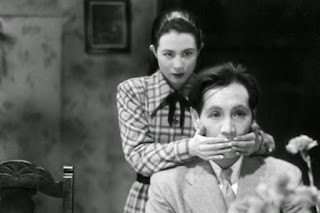 Such dedication and rigorous planning doesn't always work out, but Ran is Kurosawa's final masterpiece. The term 'epic' is thrown around far too often these days, but if one film could really be labelled as epic, it is Ran. Epic in scale, length and scope, it's a complex, exciting and bloody movie, capturing the tragedy of Shakespeare's play, and invigorating with it's Machiavellian intrigue. The ageing warlord Hidetora Ichimonji (Tatsuya Nakadai) decides to pass his throne to his eldest son Taro (Akira Terao) so he can spend his remaining years in peace. To his other sons, Jiro (Jinpachi Nezu) and the youngest Saburo (Daisuke Ryu), he leaves two large castles. Saburu objects, calling the decision folly and foreseeing instability, and is banished by his father for his loyalty.
Such dedication and rigorous planning doesn't always work out, but Ran is Kurosawa's final masterpiece. The term 'epic' is thrown around far too often these days, but if one film could really be labelled as epic, it is Ran. Epic in scale, length and scope, it's a complex, exciting and bloody movie, capturing the tragedy of Shakespeare's play, and invigorating with it's Machiavellian intrigue. The ageing warlord Hidetora Ichimonji (Tatsuya Nakadai) decides to pass his throne to his eldest son Taro (Akira Terao) so he can spend his remaining years in peace. To his other sons, Jiro (Jinpachi Nezu) and the youngest Saburo (Daisuke Ryu), he leaves two large castles. Saburu objects, calling the decision folly and foreseeing instability, and is banished by his father for his loyalty.Before Taro's backside has warmed his new throne, his wife Lady Kaede (Mieko Harada) is whispering doubts into his ear. With Hidetora still residing in the castle, Lady Kaede tells Taro that his crown is hollow and his men will never earn his respect until his father is removed. After Hidetora kills one of Jiro's men who was about to kill his fool Kyoami (Funeral Parade of Roses' (1964) Pita), Jiro banishes his father, who then seeks refuge with Jiro. But Jiro has plans of his own, and seeing Taro as a weak leader, pretends to side with Taro in preparation for a future betrayal, and also sends Hidetora packing. With nowhere to turn, the broken and increasingly senile old man wanders to the ruins of a castle he conquered in his warmongering days. But when Saburo hears of his brothers' betrayal and Lady Kaede's scheming, war begins to brew.
Kurosawa's precise planning pays off, as Ran is a gorgeous canvas of colours and scenery, to the extent that any scene could be paused, printed and hung on the wall as a piece of art. The costumes, a sumptuous blend of red's and yellow's, bring the battle scenes to life. Bodies litter the ground, streaming with bright red blood that give the movie a grim and apocalyptic feel, and when juxtaposed with Hidetora's mental decline, makes it feel like the world is literally crumbling around him. The acting is surprisingly subtle and subdued, especially when compared to Kurosawa's earlier works. Nakadai is outstanding as the lost old man, though he is helped by some impressive make-up, but the film belongs to Harada, whose ruthless conniving truly embodies Shakespeare's text. Quite simply one of the finest films ever made.
Directed by: Akira Kurosawa
Starring: Tatsuya Nakadai, Akira Terao, Jinpachi Nezu, Daisuke Ryû, Mieko Harada, Pîtâ
Country: Japan/France
Rating: *****
Tom Gillespie





